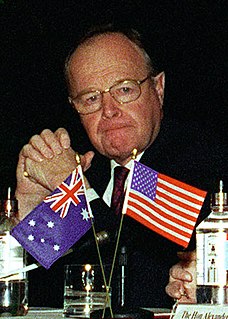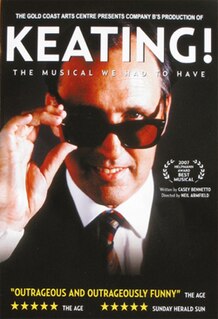See also
- Granita pact, a similar deal between Tony Blair and Gordon Brown for the prime ministership of the United Kingdom
A Kirribilli agreement (or Kirribilli deal), in Australian politics, is an agreement, typically confidential, between a leader and their deputy for the handing over of power on the satisfaction of an agreed precondition. [1]
The term was first used to describe an agreement made in November 1988 between Prime Minister Bob Hawke, and his Treasurer Paul Keating, which was effected at Kirribilli House. Hawke agreed that he would resign in favour of Keating at an unspecified time after the 1990 election but before the subsequent election. On Keating's insistence, this undertaking was witnessed by ACTU Secretary Bill Kelty and businessman Sir Peter Abeles; both were mutual friends of Hawke and Keating. After securing a fourth term in March 1990, Hawke reneged on the agreement in January 1991 following a "treacherous" speech by Keating, called the Placido Domingo speech, delivered to the National Press Club in December 1990 which belittled Hawke's leadership. [2] Keating resigned as Treasurer in June 1991 and challenged Hawke for the Prime Ministership. Although this initial challenge failed, he challenged Hawke a second time in December 1991 and won.
Whilst still in opposition, John Howard reached a similar agreement with Peter Costello in December 1994 which was witnessed by the Liberal MP Ian McLachlan. McLachlan reported that Howard agreed, if Alexander Downer resigned and Howard became leader and subsequently Prime Minister after 1996, that he would hand over the leadership to Costello after one and a half terms. [3] Howard reported that the meeting took place but that no exact deal was struck. [4] After Howard became Prime Minister, approaching his 64th birthday and after two and a half terms in 2003, he asserted his intention to stay on as leader. Costello made several public statements that did little to hide his distemper at the decision. [5]
After the 2004 election, Costello did not exercise his right to challenge for the leadership. Speculation throughout 2005 saw multiple cabinet ministers begin to be mentioned as possible successors to Howard, including Brendan Nelson, Alexander Downer, Tony Abbott and Malcolm Turnbull; of the four, Downer had already served as Liberal leader and the remaining three would all serve as Liberal leader in the future. Costello fuelled speculation that he would challenge Howard for the leadership in 2006, but Howard ultimately remained Prime Minister and Costello Treasurer up to the 2007 election, where Howard lost his seat of Bennelong and his government was defeated. Costello declined to assume the leadership, even after Howard endorsed him as his successor. [6]
The term has also been applied in various Australian state political environments including with Colin Barnett and Troy Buswell [7] and with Mike Nahan and Liza Harvey [8] in Western Australia; with Peter Beattie and Anna Bligh in Queensland; and in sport. [1]

Robert James Lee Hawke, was an Australian politician who served as Prime Minister of Australia and Leader of the Labor Party from 1983 to 1991. He was also Member of Parliament (MP) for Wills from 1980 to 1992.

Paul John Keating is an Australian politician who served as the 24th Prime Minister of Australia and the Leader of the Labor Party from 1991 to 1996. He had previously served as Treasurer in the Hawke Government from 1983 to 1991.

Simon Findlay Crean is a former Australian politician and trade unionist. He was a member of the House of Representatives from 1990 to 2013, representing the Labor Party, and served as a minister in the Hawke, Keating, Rudd and Gillard Governments. He was the leader of the Labor Party from November 2001 to December 2003.

Kim Christian Beazley is an Australian politician who is currently Governor of Western Australia. He was previously Deputy Prime Minister of Australia from 1995 to 1996, Leader of the Labor Party and Leader of the Opposition from 1996 to 2001 and 2005 to 2006, and Ambassador to the United States from 2010 to 2016. He served in multiple roles in the Hawke and Keating Governments from 1983 to 1996.

Peter Howard Costello, AC, is a former Australian politician and lawyer who served as the Treasurer in the Australian Howard Government from 1996 to 2007. He is the longest-serving Treasurer in Australia's history. Costello was a Member of the Australian House of Representatives from 1990 to 2009, representing the Division of Higgins. He also served as the Deputy Leader of the Liberal Party from 1994 to 2007.

John Robert Hewson AM is a former Australian politician who served as leader of the Liberal Party from 1990 to 1994. He led the Coalition to defeat at the 1993 federal election.

The 1996 Australian federal election was held to determine the members of the 38th Parliament of Australia. It was held on 2 March 1996. All 148 seats of the House of Representatives and 40 seats of the 76-seat Senate were up for election. The centre-right Liberal/National Coalition led by Opposition Leader John Howard of the Liberal Party and coalition partner Tim Fischer of the National Party defeated in a landslide the incumbent centre-left Australian Labor Party government led by Prime Minister Paul Keating.
The following lists events that happened during 1991 in Australia.

The 1987 Australian federal election was held in Australia on 11 July 1987, following the granting of a double dissolution on 5 June by the Governor-General Sir Ninian Stephen. Consequently, all 148 seats in the House of Representatives as well as all 76 seats in the Senate were up for election. The incumbent Australian Labor Party, led by Prime Minister Bob Hawke, defeated the opposition Liberal Party of Australia, led by John Howard and the National Party of Australia led by Ian Sinclair. This was the first, and to date only, time the Labor party won a third consecutive election.

John Winston Howard is an Australian former politician who served as the 25th Prime Minister of Australia (1996-2007) and Leader of the Liberal Party. His nearly twelve-year tenure as Prime Minister is the second-longest in history, behind only Sir Robert Menzies, who served for eighteen non-consecutive years. He has also been the oldest living former Australian Prime Minister since the death of Bob Hawke in 2019.
Ross Vincent Free is an Australian politician, and was a Labor member of the Australian House of Representatives representing the seat of Macquarie from 1980 until 1984, then Lindsay from 1984 until 1996. He served as a minister from 1990 until 1996 in both the Hawke and Keating ministries.

Ian Murray McLachlan AO is a former Australian politician who served as a member of the House of Representatives from 1990 to 1998, representing the Liberal Party. He was Minister for Defence in the Howard Government from 1996 to 1998. Before entering politics, he served as president of the National Farmers Federation from 1984 to 1988. He played first-class cricket as a youth.

Keating! is a sung-through musical which portrays the political career of former Australian Prime Minister Paul Keating. Keating was Prime Minister between 1991 and 1996; the musical follows him from his ascent to the leadership through to his eventual electoral defeat by John Howard. It was written by Casey Bennetto, who was inspired to write the show by his disappointment at the results of the 2004 federal election, which saw Howard's Coalition government returned for a fourth term. The musical takes a humorous, satirical tone and presents a positive image of Keating while frequently criticising the Howard government. Bennetto describes the show as "ridiculously pro-Paul Keating".
The 1995 Wentworth by-election was held in the Australian electorate of Wentworth in New South Wales on 8 April 1995. The by-election was triggered by the resignation of the sitting member, former Liberal Party of Australia leader Dr John Hewson on 28 February 1995. The writ for the by-election was issued on 3 March 1995.

The Hawke Government was the federal executive government of Australia led by Prime Minister Bob Hawke of the Australian Labor Party (ALP) from 1983 to 1991. The Government followed the Liberal-National Coalition Fraser Government and was succeeded by another Labor administration, the Keating Government, led by Paul Keating after an internal party leadership challenge in 1991. Keating served as Treasurer through much of Hawke's term as Prime Minister and the period is sometimes termed the Hawke-Keating Government.

The Keating Government was the federal executive government of Australia led by Prime Minister Paul Keating of the Australian Labor Party from 1991 to 1996. The Government followed on from the Hawke Government after Paul Keating replaced Bob Hawke as Labor leader in an internal party leadership challenge in 1991. Together, these two governments are often collectively described as the Hawke-Keating Government. The Keating Government was defeated in the 1996 federal election and was succeeded by the Howard Coalition government.
The Kirribilli Agreement of 1988 was a secret meeting between the Australian Prime Minister Bob Hawke and Treasurer Paul Keating. The two men met at Kirribilli House, the Prime Minister's official Sydney residence, to make an agreement as to when Hawke would hand over the leadership of the Australian Labor Party.

A leadership spill of the Australian Labor Party (ALP), the party of government in the Parliament of Australia, was held on 19 December 1991, the second spill in a year. Backbencher and former Treasurer Paul Keating defeated Prime Minister Bob Hawke, who had led Labor for eight and a half years.

A leadership spill in the Australian Labor Party, the party of government in the Parliament of Australia, was held on 3 June 1991. It was the first of two ballots that year with Prime Minister Bob Hawke surviving the ballot against Treasurer Paul Keating, who then went to the backbench.
The early 1990s recession saw a period of economic downturn affect much of the world in the late 1980s and early 1990s. The economy of Australia suffered its worst recession since the Great Depression.